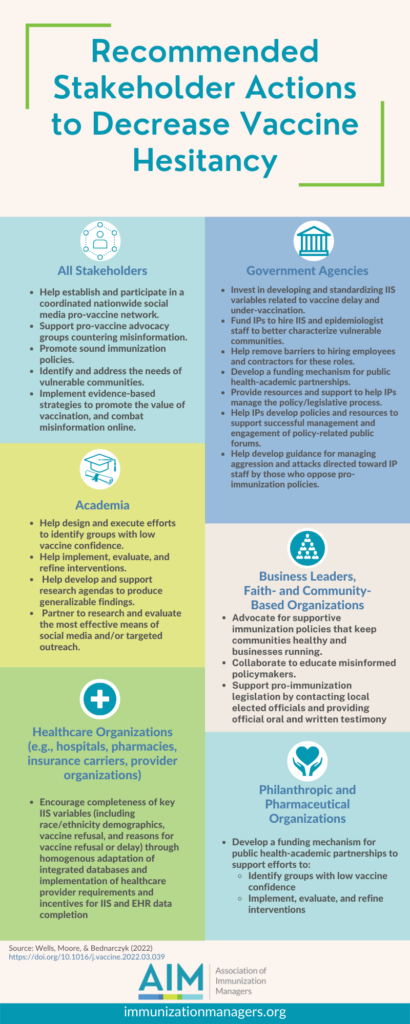Infographic: Supporting Immunization Programs to Address COVID-19 Vaccine Hesitancy: Recommendations for National and Community-Based Stakeholders
In collaboration with Immunize.org and Emory University, AIM’s Chief Research and Development Officer, Katelyn Wells, Ph.D., recently published an article in Vaccine titled Supporting Immunization Programs to Address COVID-19 Vaccine Hesitancy: Recommendations for national and Community-Based Stakeholders. This infographic provides actionable recommendations for stakeholders to decrease vaccine hesitancy.
Recommended Stakeholder Actions to Decrease Vaccine Hesitancy
All Stakeholders
- Help establish and participate in a coordinated, nationwide social media pro-vaccine network.
- Support pro-vaccine advocacy groups countering misinformation.
- Promote sound immunization policies.
- Identify and address the needs of vulnerable communities.
- Implement evidence-based strategies to promote the value of vaccination and combat misinformation online.
Government Agencies
- Invest in developing and standardizing IIS variables related to vaccine delay and under-vaccination.
- Fund IPs to hire IIS and epidemiologist staff to better characterize vulnerable communities.
- Help remove barriers to hiring employees and contractors for these roles.
- Develop a funding mechanism for public health-academic partnerships.
- Provide resources and support to help IPs manage the policy/legislative process.
- Help IPs develop policies and resources to support successful management and engagement of policy-related public forums.
- Help develop guidance for managing aggression and attacks directed toward IP staff by those who oppose pro-immunization policies.
Academia
- Help design and execute efforts to identify groups with low vaccine confidence.
- Help implement, evaluate, and refine interventions.
- Help develop and support research agendas to produce generalizable findings.
- Partner to research and evaluate the most effective means of social media.
Business Leaders, Faith- and Community- Based Organizations
- Advocate for supportive immunization policies that keep communities healthy and businesses running.
- Collaborate to educate misinformed policymakers.
- Support pro-immunization legislation by contacting local elected officials and providing official oral and written testimony.
Healthcare Organizations (e.g., hospitals, pharmacies, insurance carriers, provider organizations)
- Encourage completeness of key IIS variables (including race/ethnicity demographics, vaccine refusal, and reasons for vaccine refusal or delay) through homogenous adaptation of integrated databases and implementation of healthcare provider requirements and incentives for IIS and EHR data completion
Philanthropic and Pharmaceutical Organizations
- Develop a funding mechanism for public health-academic partnerships to support efforts to:
- Identify groups with low vaccine confidence
- Implement, evaluate, and refine interventions

